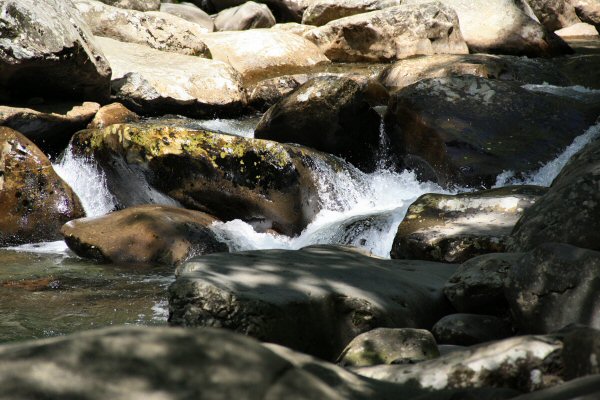Choose your deicer with the environment in mind
Winter Tip
As winter sets in across Tennessee, so too does the need to keep pedestrian paths clear of snow and ice. Deicers and traction agents are used to achieve safe passage, but many commercially available products may be harmful to the environment and human health, especially if used incorrectly. Studies have documented that up to 55 percent of deicing compounds are carried into waterways by stormwater runoff, while the remaining 45 percent infiltrates into the ground therefore affecting soils and potentially the groundwater.
Sodium chloride, or rock salt, is the most commonly used deicer because of its cost effectiveness, says Dr. Andrea Ludwig, an assistant professor of biosystems engineering and soil science with the University of Tennessee Institute of Agriculture and the UT Stormwater Management Assistance Research and Training (SMART) Center. However, Ludwig cautions that rock salt is not the best choice for an environmentally sound deicer. “Rock salt is highly corrosive and can lead to environmental degradation when applied in large quantities. In soils, sodium chloride inhibits soil microbial activity, which affects soil structure.” Soil microbes and their associated products act like glue to hold together soil particles. Without this glue, soil is more erodible and likely to end up in streams and wetlands. Ludwig says other documented adverse environmental impacts of rock salt include loss of streamside vegetation, changes in aquatic community composition from sensitive species to tolerant species, and behavior changes in mammals and birds.
“Sodium chloride can also infiltrate into the groundwater and cause taste and health concerns related to drinking water. In serious cases, high sodium intake from drinking water may be linked to hypertension,” she says.
Other common deicers are calcium chloride, potassium chloride, and magnesium chloride. Ludwig says these compounds are more effective per unit mass, and therefore require smaller applications. “Because of this, these are relatively more environmentally friendly than rock salt, but they are still corrosive,” she says. “If you must use a deicer, make sure it is low in phosphorus content. Use pellets instead of small flakes to ensure slow dissolution. “
So what are the better choices for deicing sidewalks and pathways? Environmentally friendly deicers are biodegradable, Ludwig says. She recommends calcium magnesium acetate (CMA), potassium acetate, and other corn-based liquid concentrates, which are non-corrosive and biodegradable.
Of course, the most environmentally friendly and best physical health choice is pure elbow grease. Shovel and scoop as much snow and ice as possible before turning to chemical agents.
Sand, kitty litter, and ash are commonly used as traction agents to prevent slipping on icy areas – usually paved surfaces. As the weather cycle passes and icy conditions recede, these agents have the potential to be washed into nearby streams by stormwater and become a pollutant to the aquatic environment. Cracked corn is an environmentally friendly alternative and has the potential to be eaten by wildlife before it enters waterways.
Ludwig reminds homeowners that prolonged periods of freezing conditions can wreak havoc on your rain barrel or cistern plumbing that is exposed to the elements. “If you have an aboveground rain barrel or cistern collecting rooftop runoff from your home or other structures, then you need to watch the weather and consider winterizing your system,” she recommends. “Disconnect any plastic or PVC pipes and valves that may be cracked by freezing pockets of water. Also, store yard wastes or compost pits away from storm sewers to keep harmful organic pollutants out of streams.”
For more information on how to protect our water resources with an environmentally friendly yard year round visit the Tennessee Yards and Neighborhoods website (https://ag.tennessee.edu/tnyards).












